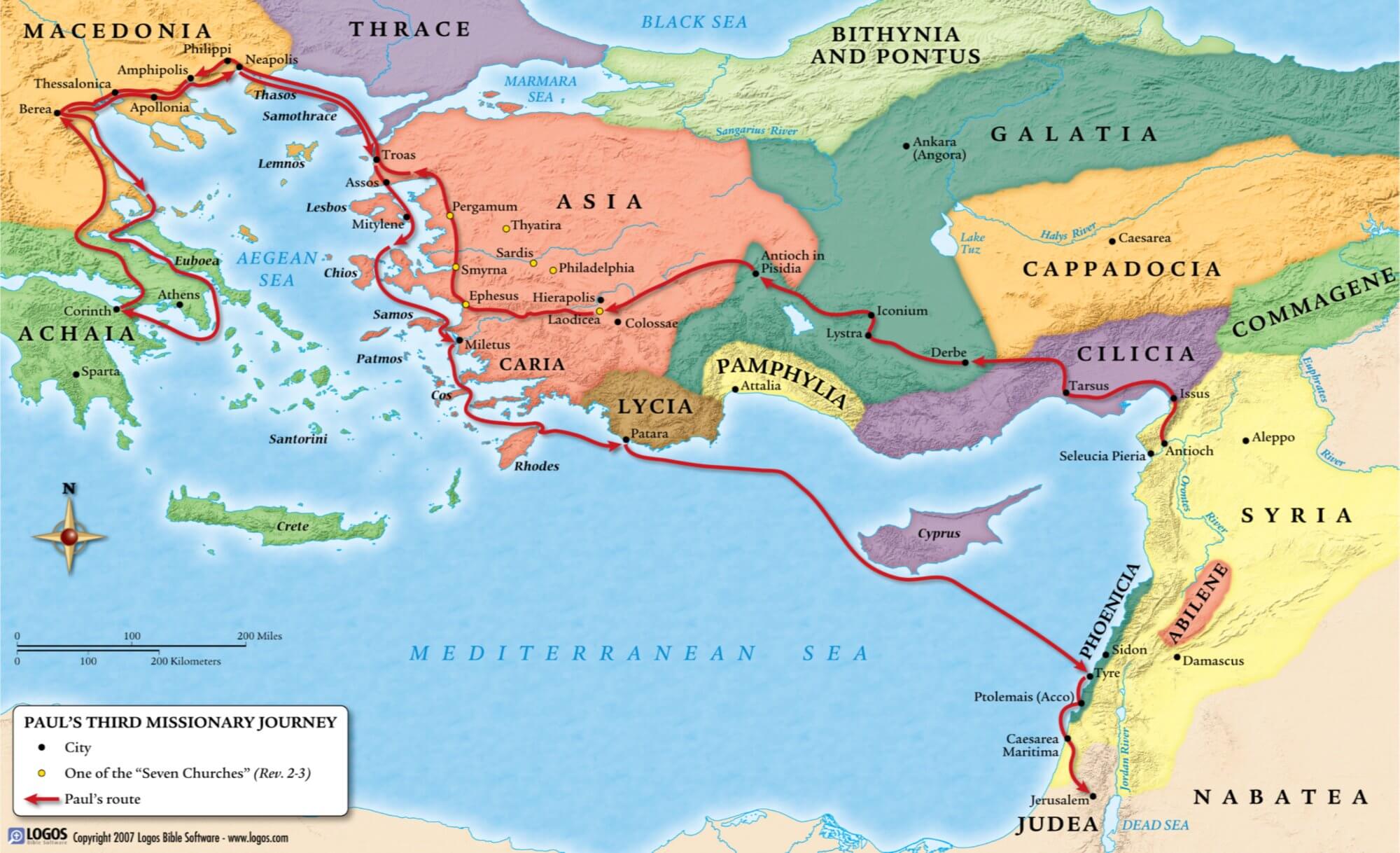
Displayed here by directly pulling content from the source’s website. Source: Understanding Christianity,
http://www.understandchristianity.com/wp-content/uploads/2015/08/Timeline-Pauls-3rd-Missionary-Journey.jpg.

Displayed here by directly pulling content from the source’s website. Source: Understanding Christianity,
http://www.understandchristianity.com/wp-content/uploads/2015/08/Timeline-Pauls-3rd-Missionary-Journey.jpg.
Paul wish to give the Ephesian leader such encouragement as they needed. The speech which follows is not only his fellow farewell speech to them (and to the church which they represented) but (so far as the perspective of the Acts is concerned) his last will and testament to the churches which he had planted both east and west of the Aegean. (Bruce, 387)
The speech is quite distinctive among all the speeches reported in acts. It is the only Pauline speech delivered to Christians which Luke has recorded, and it is not surprising to discover how rich it is in parallels to the Pauline letters … (Bruce, 387)
The speech is mainly hortatory, but also in part apologetic. It seems to be implied here and there that Paul’s opponents and the province of Asia had tried to prejudice his converts’ minds against him in his absence; he therefore defends his teaching and general behavior by appealing to his hearers’ personal knowledge of him. He perceives at the opposition of his teaching which has already begun to manifest itself in the Ephesian church will increase, and that the church will be invaded by false teachers from outside. It’s leaders must therefore fulfill their responsibility as shepherds, appointed by God, to guard his flock (Bruce, 388).
16 For Paul had decided to sail past Ephesus, so that he might not have to spend time in Asia, for he was hastening to be at Jerusalem, if possible, on the day of Pentecost.
17 Now from Miletus he sent to Ephesus and called the elders of the church to come to him. 18 And when they came to him, he said to them:
“You yourselves know how I lived among you the whole time from the first day that I set foot in Asia, 19 serving the Lord with all humility and with tears and with trials that happened to me through the plots of the Jews;
20 how I did not shrink from declaring to you anything that was profitable, and teaching you in public and from house to house, 21 testifying both to Jews and to Greeks of repentance toward God and of faith in our Lord Jesus Christ.
22 And now, behold, I am going to Jerusalem, constrained by the Spirit, not knowing what will happen to me there, 23 except that the Holy Spirit testifies to me in every city that imprisonment and afflictions await me.
24 But I do not account my life of any value nor as precious to myself, if only I may finish my course and the ministry that I received from the Lord Jesus, to testify to the gospel of the grace of God.
Self-preservation was not a motive which he esteemed highly: his main concern was to fulfill the course which Christ had marked out for him to run, preaching in the Spirit’s power the good news of God’s free Grace in Christ. Life or death was not the issue that mattered: what mattered most was, as he told another church, that Christ should be magnified in his body, “whether by life or by death” (Phil.1:20). (Bruce, 390)
25 And now, behold, I know that none of you among whom I have gone about proclaiming the kingdom will see my face again. 26 Therefore I testify to you this day that I am innocent of the blood of all, 27 for I did not shrink from declaring to you the whole counsel of God.
Paul could say he was “innocent” (cf. Jer. 23:1-2), not because he had presented the gospel to every individual personally. He had carried out the mission God had given him of evangelizing most or many of the pagan Gentile areas. The Christians remaining in Asia could continue to evangelize more thoroughly (cf. Ezek. 33:1-6). (Constable)
Like Ezekiel’s trustworthy watchman, he had sounded the trumpet so that all the province of Asia had heard. If there were any who paid no heed, their blood would be on their own heads: Paul was free of responsibility for their doom. (Bruce, 392)
"I know that all of you. . .will see my face no more" He was planning to go to Spain (cf. Rom. 15:24,28), but this possibly contextually refers to his upcoming, predicted imprisonment and possible death at Jerusalem. (Utley)
Barclay, William. William Barclay’s Daily Study Bible [NT]. “Acts 20,” https://bibleportal.com/commentary/chapter/william-barclay/acts/20.
Bruce, F. F. The Book of Acts: The New International Commentary on the New Testament. Ed. Gordon D. Fee, Grand Rapids: William B. Eerdmanns Publishing Company, 1988.
Constable, Thomas. "Notes on Acts.” 2021 ed., https://planobiblechapel.org/tcon/notes/pdf/acts.pdf.
Scripture quotations [unless otherwise noted] are from the ESV® Bible (The Holy Bible, English Standard Version®), Copyright © 2001 by Crossway, a publishing ministry of Good News Publishers. Used by permission. All rights reserved.
Utley, Bob. “Acts 20” and “Acts 21.” Bible.org, from the Series: “Luke the Historian: Acts,” Bible Lessons International, 2012, https://bible.org/seriespage/acts-20 and https://bible.org/seriespage/acts-21.